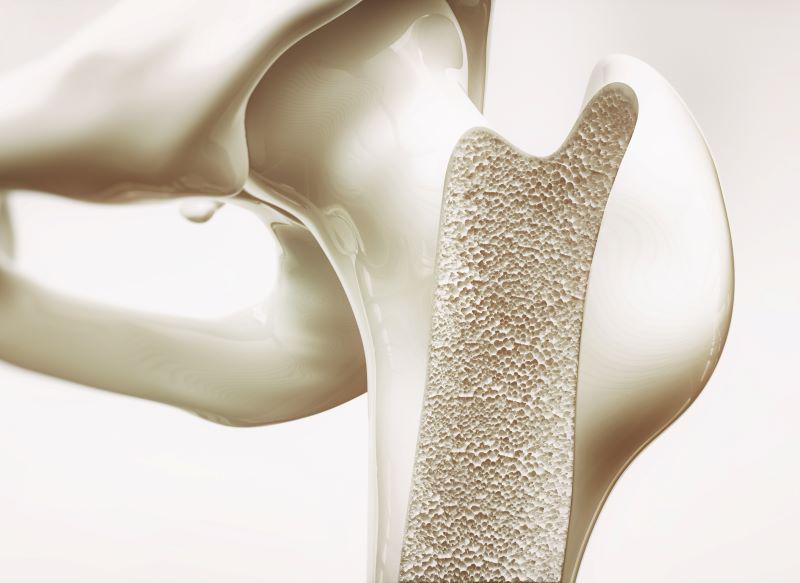Submit your contact info here or click the "Contact me about Sync" button below and we will reach out to you with more information.
Get Healthy!

- Amy Norton
- Posted March 23, 2023
Weaker Bones, Weakening Brain? Study Makes the Connection
For some older adults, thinning bones may be a harbinger of waning memory, a new study suggests.
The study, of more than 3,600 older adults, found that those with relatively low bone density were at greater risk of being diagnosed with dementia within the next decade. The one-third of participants with the lowest bone mass at the hip faced double the risk of dementia as the third with the strongest hip bones.
Researchers said the findings -- published March 22 in the journal Neurology -- do not mean that thinner bones help cause dementia.
Instead, they suspect that declining bone mass is one part of the early dementia process -- before problems with memory and thinking skills become apparent.
And that implies that doctors should pay attention to bone health as soon as older adults are diagnosed with dementia, said senior researcher Dr. Mohammad Arfan Ikram.
One of the main reasons that people with dementia end up in nursing homes is poor mobility and falls, noted Ikram, a professor at Erasmus University Medical Center in Rotterdam, the Netherlands.
"We know that low bone mineral density is a strong risk factor for poor mobility, and falls and fractures," he said. "Therefore, it can be helpful in persons with early-stage dementia to also pay proper attention to their bone health -- and where possible optimize it."
The study is not the first to connect bone health to dementia risk.
"This is an association we've seen before. For example, osteoporosis has been linked to dementia risk," said Heather Snyder, vice president of medical and scientific relations at the Alzheimer's Association.
It's not completely clear why bone and brain health are connected, according to Snyder, who was not involved in the new research. But poor nutrition and lack of physical activity could be part of the story, she said.
Both can contribute to bone loss and to cognitive decline (problems with memory and thinking that may progress to dementia). Conversely, people in cognitive decline can become less active or change their eating habits for the worse, which could affect their bone density.
Ikram agreed that inadequate nutrition and lack of physical activity could be at work. But he and his colleagues point to other possibilities, too: There's some evidence, for example, that the abnormal "plaque" proteins that build up in the brains of people with Alzheimer's can actually harm bone density.
Although past studies have connected bone loss to dementia, Ikram said the timing of things has not been clear: Does the bone loss appear years before dementia symptoms do?
To find out, researchers analyzed data from a long-running health study, begun in 1990. They focused on 3,651 participants who, in the early 2000s, were mostly in their 60s or 70s and underwent bone density testing. All were free of dementia at that point.
By January 2020, about 19% were newly diagnosed with dementia, mostly Alzheimer's.
On average, the study found, people who'd had low bone density at the outset were at increased risk of developing dementia -- particularly within the next 10 years.
Those who were in the bottom third for hip bone density had twice the risk of a dementia diagnosis within the next decade, compared to those in the top third.
It's important, though, to put the risk in perspective, according to Ikram. Bone loss is extremely common with age, and most older adults with thinning bones will not develop dementia, he said.
In this study, of the nearly 1,200 older adults with the lowest hip bone density, 86 were diagnosed with dementia within 10 years.
So no one is saying that bone density should be used to screen older adults for early dementia. Instead, Ikram said, bone health should be on everyone's radar when an older person is diagnosed with the brain disease.
At the same time, it is thought that many of the things that support overall physical health are good for the brain, too.
Snyder said that a healthy diet, exercise, and staying mentally and socially engaged "are all things we can do today to maximize our brain health."
She noted that the Alzheimer's Association is running a clinical trial that is testing whether those lifestyle measures can help preserve brain function in older adults who are at increased risk of cognitive decline.
More information
The Alzheimer's Association has advice on a brain-healthy lifestyle.
SOURCES: Mohammad Arfan Ikram, MD, PhD, professor, epidemiology, Erasmus University Medical Center, Rotterdam, Netherlands; Heather Snyder, PhD, vice president, medical and scientific relations, Alzheimer's Association, Chicago; Neurology, March 22, 2023, online







